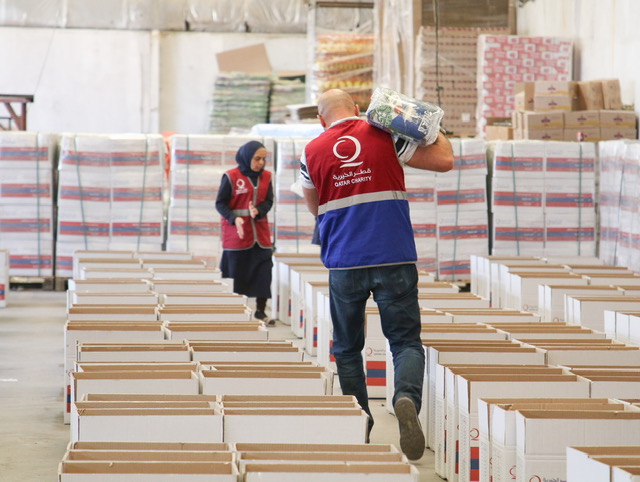Aid deliveries have been disrupted since Israeli occupation forces occupied the Egypt-Gaza Rafah Crossing on May 6.
Qatar Charity (QC) has sent life-saving food and medical aid to Palestinians in the Gaza Strip through Jordan amid Israel’s ongoing closure of the vital Rafah Crossing.
The four-day initiative took place in cooperation with the Jordan Hashemite Charity Organization (JHCO) with the aim of helping thousands of people, Qatar’s state news agency (QNA) reported on Saturday.
The aid shipment included 10,000 food parcels that are expected to benefit about 50,000 beneficiaries – sufficient for one family for an entire month – in addition to 15 tonnes of medical supplies.
The shipment’s launch took place under the presence of Sheikh Saud Al Thani, Qatar’s ambassador to Jordan, and the General Supervisor of QC’s office in Jordan, Saleh Al Marri.
“It is a humanitarian duty that we always carry out through constant coordination with our brothers in Jordan,” Al Thani said, noting QC will continue to support people in need in Jordan.
QC has been providing aid to Gaza since the beginning of Israel’s war on Gaza last October. It has previously delivered 1,000 tonnes of aid onboard 95 planes that flew to Egypt’s El-Arish, according to QNA, where it was then transferred across the Rafah border crossing.
Aid deliveries have been disrupted since Israeli occupation forces occupied the border on May 6, where aid trucks have already been lining up for months waiting for Israeli permission to cross into the Strip.
Less than 200 trucks have been crossing into Gaza per day since the start of the war, a figure that is significantly lower than the pre-war daily average of 500 trucks.
Since Israel took over the Rafah Crossing, it was opened just once after 20 days for less than 24 hours, during which only 200 aid trucks – including four fuel trucks – entered, according to Palestine’s news agency Wafa.
Israeli attack on UNRWA
Last January, Israel has accused some employees from the UN refugee agency for Palestinians – which provides humanitarian assistance – of involvement in the Hamas surprise attack of October 7, prompting at least 16 countries to cut funding to the agency.
The countries, including the United States, represented $440m of the agency’s overall funding, according to UNRWA.
The majority of the countries have resumed funding UNRWA after an independent investigation in April found no grounds for Israel’s claims.
The countries that resumed their funds so far include Germany, the European Union, Sweden, Japan, France, Canada, Australia, and Italy among others. The U.S. – Israel’s main ally and military backer – decided to freeze its funds until March 2025.
UNRWA has been one of Israel’s primary targets throughout the war, killing 192 of its staff and destroying at least 179 of its facilities.
On May 29, the Israeli Knesset approved a draft law aimed at designating UNRWA, the main aid provider for Palestinian refugees, as a “terrorist organisation,” stipulating the complete closure of the agency’s offices in Israel.
If passed, the law would grant Israel the greenlight to proceed with its attacks on the agency and its facilities.
Qatar has renewed its condemnation over Israel’s targeting of UNRWA on Sunday, describing it as “an extension of the systematic targeting campaign aimed at dismantling the agency.”
In a statement, the Qatari foreign ministry called on the international community “to stand firmly in the face of the Israeli plans,” underlining UNRWA’s crucial support for millions of Palestinians in Gaza, the West Bank, Jordan, Syria and Lebanon.
Israel’s attack on UNRWA comes is part of its chokehold over aid, widely slammed by rights organisations globally as a “weaponisation of starvation” and a form of “collective punishment.”
At least 37 people have died in Gaza as a direct result of malnutrition and dehydration since the beginning of the war, according to Wafa. The latest victim was a 13-year-old child who died on Saturday in Al-Aqsa Martyrs Hospital in Deir Al-Balah, central Gaza Strip.
More than one million people in Gaza are currently facing catastrophic levels of food insecurity with at least 50,000 children requiring treatment for acute malnutrition, according to the UN.
The brutal Israeli onslaught has neared its eight-month mark, with at least 36,439 Palestinians killed, a figure that is only expected to rise as Israel continues to pummel the Strip.
Mediators Qatar, Egypt and the U.S. have been scrambling for a deal between Israel and Hamas in hopes of reaching a ceasefire deal that would also entail the entry of aid as well as the reconstruction of Gaza.
The cost of damage to Gaza’s infrastructure during the first four months of the war alone was estimated at $18.5bn, according to a March report by the World Bank and the UN.
Housing units account for 72 percent of the damage costs, or $13.3bn, whereas public service, energy, and water facilities have suffered nearly $800m in damages.







